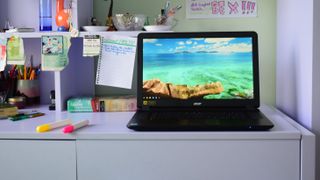Acer leads Chromebook sales with growing market
27% jump from 2014

Worldwide sales of Chromebooks are expected to reach 7.3 million units this year, representing a 27% increase from 2014, according to a report from Gartner Research. The biggest consumer of Chromebooks is the education market, and Google is continuing to go after enterprise sales with initiatives like Chrome for Work.
"In 2014, the education sector purchased 72% of Chromebooks in EMEA, 69% in Asia/Pacific, and 60% in the US," according to the report.
Sales of Chromebooks will continue to increase, and Gartner estimates that 8 million devices may ship next year.
Education
Although manufacturers such as Asus, HP, Lenovo and Toshiba make Chromebooks for consumers, in recent years manufacturers like Dell and Acer have made Chromebooks that are designed specifically for the education segment. These models come with a more durable design, and Dell's Chromebook 11 ($249, £170, AU$320) comes with enterprise-like capabilities, such as a sealed keyboard and trackpad.
Educators may continue to adopt Chromebooks for several reasons, including an always-updated experience that doesn't require users to check for OS or security patches, integration with Google services like Google Docs and a relatively lower entry level price than a Windows notebook. Many Chromebooks start at around $200 (£127, AU$253).
Enterprise
Chromebook adoption is still relatively small in the business market, with 16.5% in the Asia/Pacific region (APAC), 0.9% in Europe and the Middle Eastern market (EMEA) and 1.1% in the US.
"Chromebook is a device that can be considered by SMBs or new startup companies that do not have the resources to invest too much in IT infrastructure," the report states. "Chromebooks will become a valid device choice for employees as enterprises seek to provide simple, secure, low-cost and easy-to-manage access to new web applications and legacy systems, unless a specific application forces a Windows decision."
Are you a pro? Subscribe to our newsletter
Sign up to the TechRadar Pro newsletter to get all the top news, opinion, features and guidance your business needs to succeed!
As many vertical businesses still rely on custom apps, Google has been working to make Chromebooks more appealing to this market by porting Android apps to Chrome OS, opening up the Chrome ecosystem to more than 1.3 million Android titles. Those who work in Microsoft Office can also use Office 365 on the web or Google Docs as an alternative.
Google is also targeting the enterprise market with dedicated services and features. Chrome for Work brings better Chromebook management, single sign-on support and optimized virtualization options for those who want to use a Chromebook as a thin client. With VMware and Nvidia support, Chromebooks can be used as a client to run 3D modeling and simulation programs. Google is offering all of these features for an annual subscription rate of $50 per device per year.
Business users who demand more from their Chromebooks now have more powerful options, including the Chromebook Pixel ($999, £799, AU$1,277) and the Acer Chromebook 15 C910 ($499.99, £249, AU$620). Both these systems come with an Intel Core i5 Broadwell chip, the same processor that's found on thin and light Ultrabooks.
Consumers
The general consumer market is the second largest market for Chromebook adoption outside of education, capturing 38.6% of market share in the US, 26.8% in EMEA and 14.6% in APAC.
The low cost and availability at big box retailers like Best Buy may help consumer sales of Chromebook continue to increase.
"The majority of Chromebook users are tech-savvy individuals who purchase one as a companion device to their primary notebook or desktop PC," the report indicates. "Others are buying a Chromebook for the household to use as a second low-cost PC alternative."
Despite the low acquisition cost of Chromebooks, Chromebooks may not appeal to consumers in developing markets where internet connectivity is limited due to its heavy reliance on the web.
Acer took the lead in the worldwide Chromebook market, with 2 million units. Even though Samsung pulled out of the Chromebook market in Europe to focus on tablets, the company shipped 1.7 million Chromebooks worldwide and secured a second place finish.
- Read our review of Chrome OS
